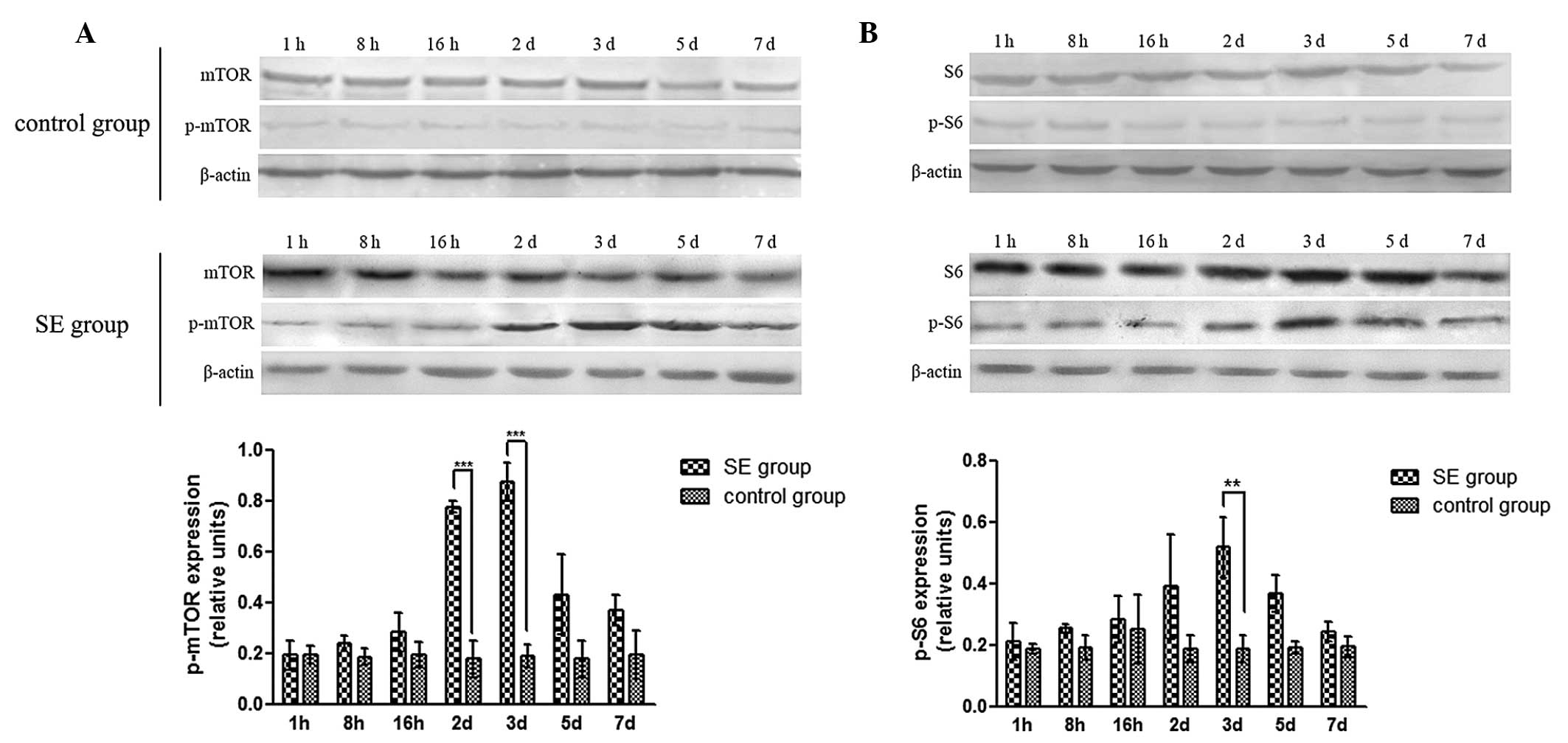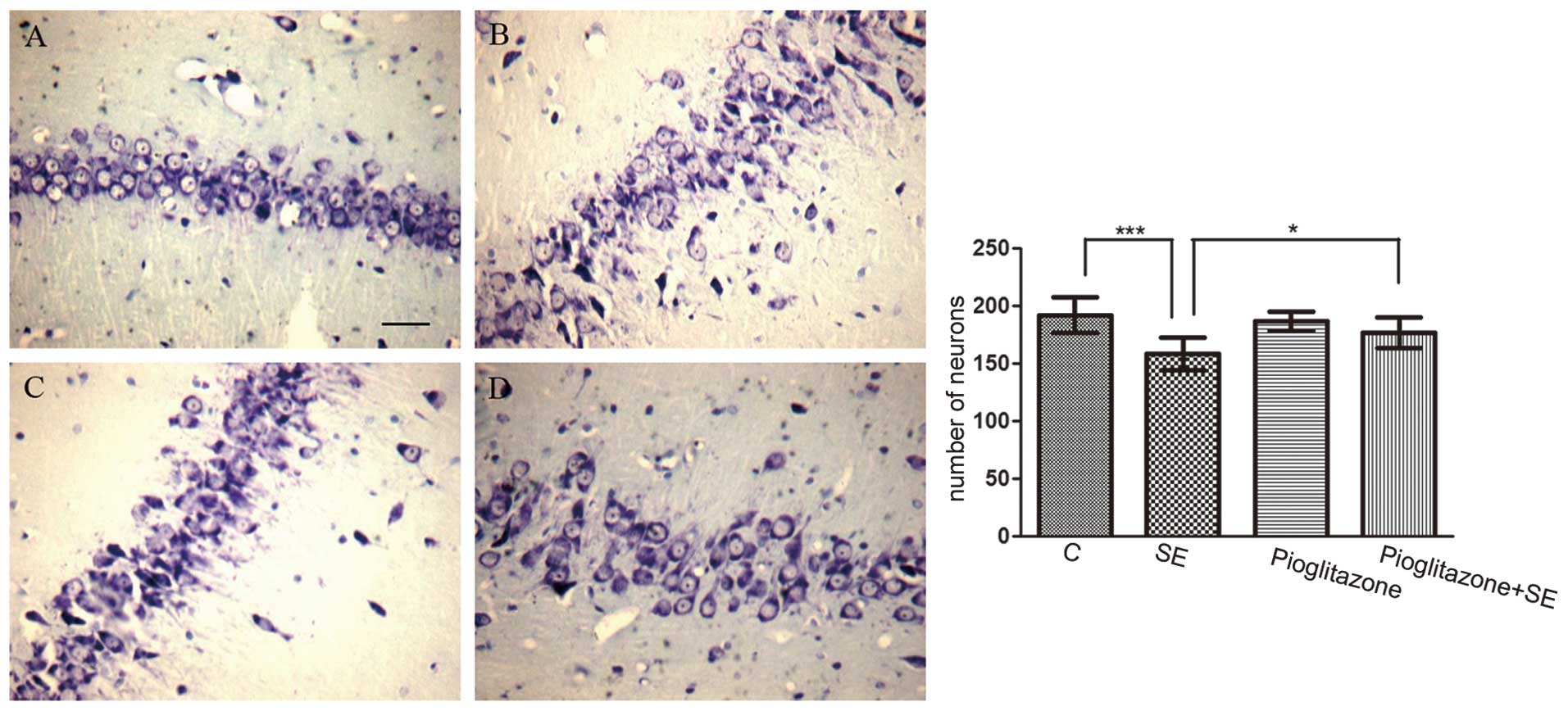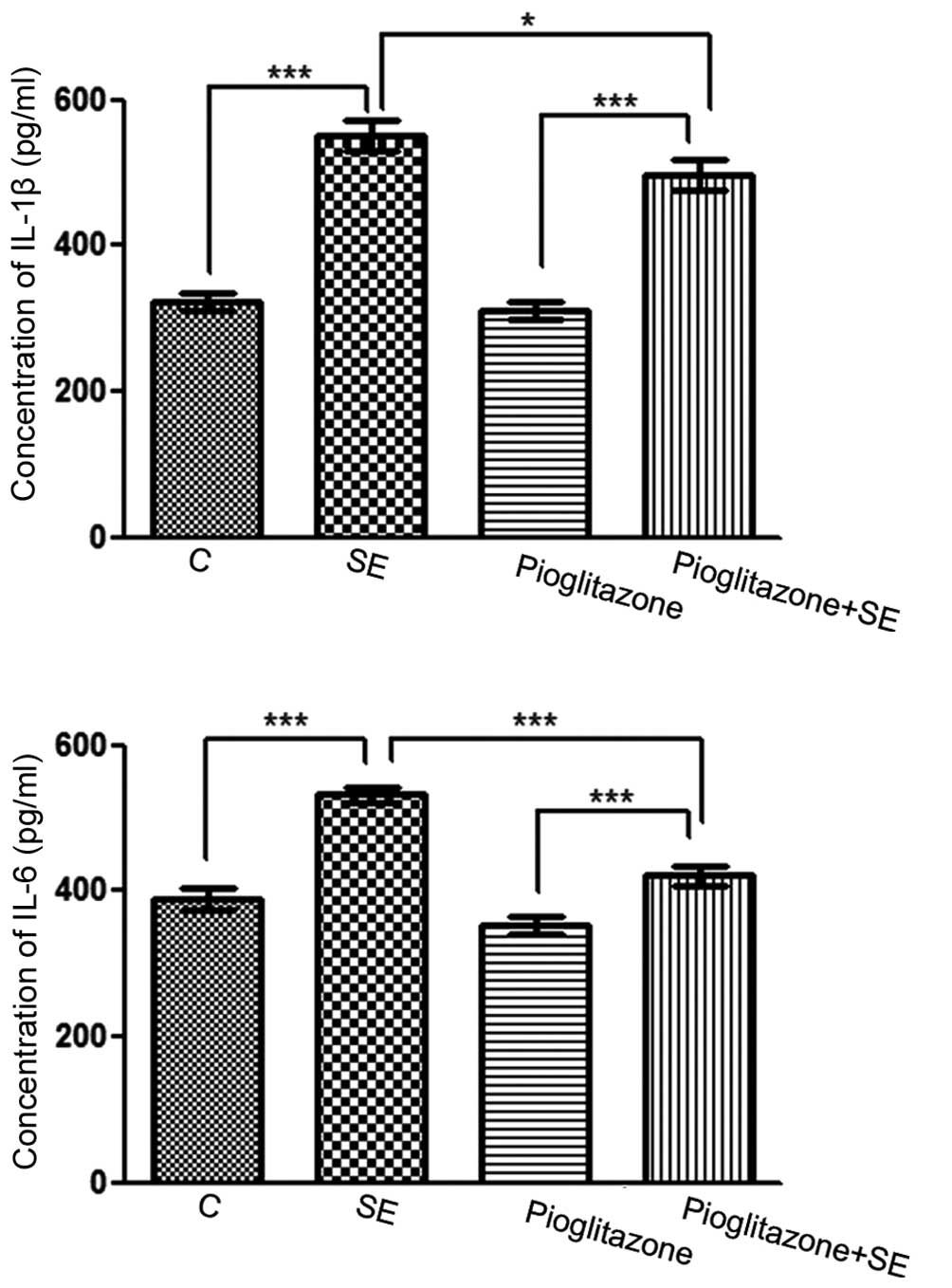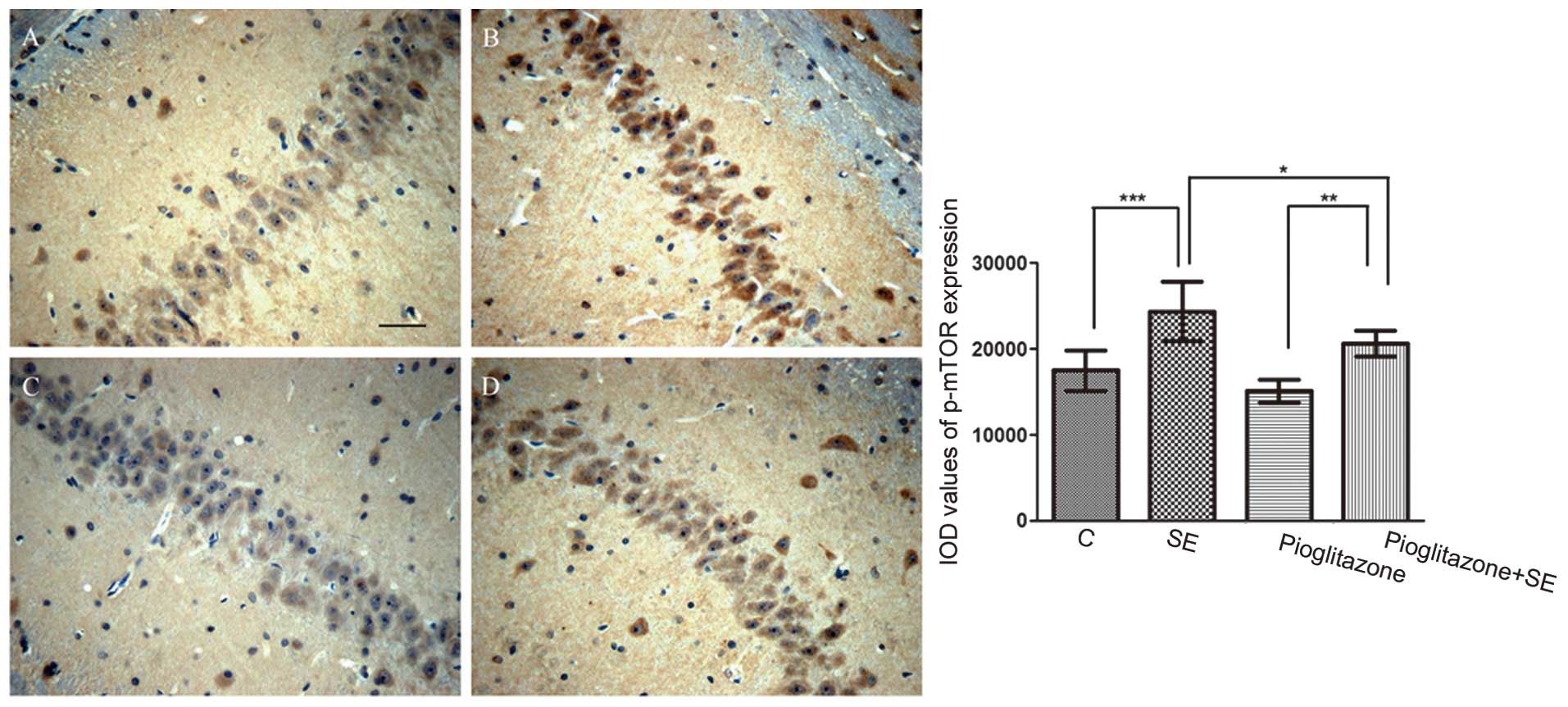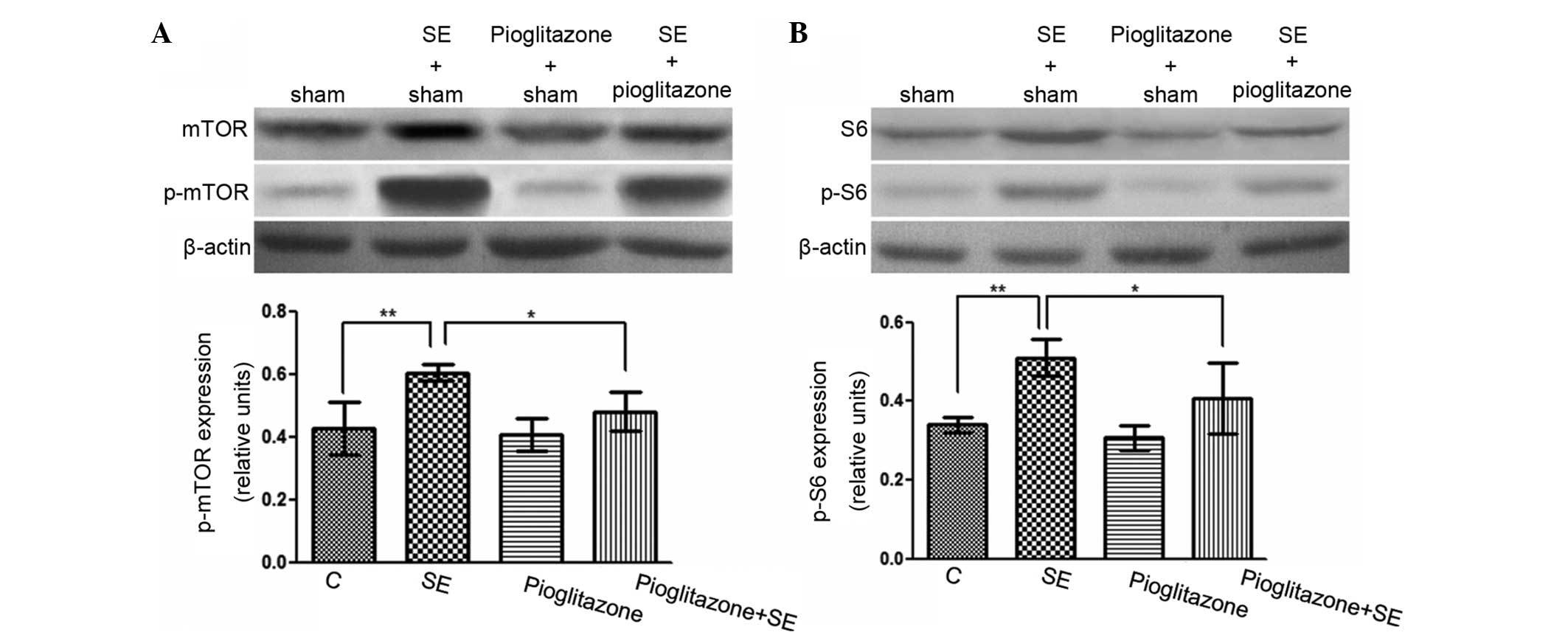|
1
|
Pierzchała K and Machowska-Majchrzak A:
Late onset of epilepsy. Wiad Lek. 56:577–581. 2003.In Polish.
|
|
2
|
Sliwa A, Plucinska G, Bednarczyk J and
Lukasiuk K: Post-treatment with rapamycin does not prevent
epileptogenesis in the amygdala stimulation model of temporal lobe
epilepsy. Neurosci Lett. 509:105–109. 2012. View Article : Google Scholar : PubMed/NCBI
|
|
3
|
Wong M: Rapamycin for treatment of
epilepsy: antiseizure, antiepileptogenic, both, or neither?
Epilepsy Curr. 11:66–68. 2011. View Article : Google Scholar : PubMed/NCBI
|
|
4
|
Cho CH: Frontier of epilepsy research-mTOR
signaling pathway. Exp Mol Med. 43:231–274. 2011. View Article : Google Scholar : PubMed/NCBI
|
|
5
|
Inoki K, Zhu T and Guan KL: TSC2 mediates
cellular energy response to control cell growth and survival. Cell.
115:577–590. 2003. View Article : Google Scholar : PubMed/NCBI
|
|
6
|
Park IH, Bachmann R, Shirazi H and Chen J:
Regulation of ribosomal S6 kinase 2 by mammalian target of
rapamycin. J Biol Chem. 277:31423–31429. 2002. View Article : Google Scholar : PubMed/NCBI
|
|
7
|
Reinhard C, Thomas G and Kozma SC: A
single gene encodes two isoforms of the p70 S6 kinase: activation
upon mitogenic stimulation. Proc Natl Acad Sci USA. 89:4052–4056.
1992. View Article : Google Scholar : PubMed/NCBI
|
|
8
|
Loane DJ, Deighan BF, Clarke RM, Griffin
RJ, Lynch AM and Lynch MA: Interleukin-4 mediates the
neuroprotective effects of rosiglitazone in the aged brain.
Neurobiol Aging. 30:920–931. 2009. View Article : Google Scholar
|
|
9
|
Limor R, Sharon O, Knoll E, Many A,
Weisinger G and Stern N: Lipoxygenase-derived metabolites are
regulators of peroxisome proliferator-activated receptor gamma-2
expression in human vascular smooth muscle cells. Am J Hypertens.
21:219–223. 2008. View Article : Google Scholar : PubMed/NCBI
|
|
10
|
Bernardo A and Minghetti L: Regulation of
glial cell functions by PPAR-gamma natural and synthetic agonists.
PPAR Res. 2008:8641402008. View Article : Google Scholar : PubMed/NCBI
|
|
11
|
Zang L, Mu YM, Lu ZH, et al: LRP16 gene
causes insulin resistance in C2-C12 cells by inhibiting the IRS-1
signaling and the transcriptional activity of peroxisome
proliferator actived receptor gamma. Zhonghua Yi Xue Za Zhi.
91:1408–1412. 2011.In Chinese. PubMed/NCBI
|
|
12
|
Kim KY, Cho HS, Jung WH, Kim SS and Cheon
HG: Phosphatase and tensin homolog deleted on chromosome 10
suppression is an important process in peroxisome
proliferator-activated receptor-gamma signaling in adipocytes and
myotubes. Mol Pharmacol. 71:1554–1562. 2007. View Article : Google Scholar : PubMed/NCBI
|
|
13
|
Sozio MS, Lu C, Zeng Y, Liangpunsakul S
and Crabb DW: Activated AMPK inhibits PPAR-{alpha} and PPAR-{gamma}
transcriptional activity in hepatoma cells. Am J Physiol
Gastrointest Liver Physiol. 301:G739–747. 2011. View Article : Google Scholar : PubMed/NCBI
|
|
14
|
Motte JE, da Silva Fernandes MJ, Marescaux
C and Nehlig A: Effects of pentylenetetrazol-induced status
epilepticus on c-Fos and HSP72 immunoreactivity in the immature rat
brain. Brain Res Mol Brain Res. 50:79–84. 1997. View Article : Google Scholar : PubMed/NCBI
|
|
15
|
Nehlig A and Pereira de Vasconcelos A: The
model of pentylenetetrazol-induced status epilepticus in the
immature rat: short- and long-term effects. Epilepsy Res.
26:93–103. 1996. View Article : Google Scholar : PubMed/NCBI
|
|
16
|
Pineau N, Charriaut-Marlangue C, Motte J
and Nehlig A: Pentylenetetrazol seizures induce cell suffering but
not death in the immature rat brain. Brain Res Dev Brain Res.
112:139–144. 1999. View Article : Google Scholar : PubMed/NCBI
|
|
17
|
Erdogan F, Golgeli A, Arman F and Ersoy
AO: The effects of pentylenetetrazole-induced status epilepticus on
behavior, emotional memory and learning in rats. Epilepsy Behav.
5:388–393. 2004. View Article : Google Scholar
|
|
18
|
el Hamdi G, de Vasconcelos AP, Vert P and
Nehlig A: An experimental model of generalized seizures for the
measurement of local cerebral glucose utilization in the immature
rat. I Behavioral characterization and determination of lumped
constant. Brain Res Dev Brain Res. 69:233–242. 1992. View Article : Google Scholar : PubMed/NCBI
|
|
19
|
Bradford MM: A rapid and sensitive method
for the quantitation of microgram quantities of protein utilizing
the principle of protein dye binding. Anal Biochem. 72:248–254.
1976. View Article : Google Scholar : PubMed/NCBI
|
|
20
|
Augustinack JC, van der Kouwe AJ,
Blackwell M1, et al: Detection of entorhinal layer II using 7Tesla
[corrected] magnetic resonance imaging. Ann Neurol. 57:489–494.
2005. View Article : Google Scholar : PubMed/NCBI
|
|
21
|
Zhang X, Peng X, Yu W, et al:
Alpha-tocopheryl succinate enhances doxorubicin-induced apoptosis
in human gastric cancer cells via promotion of doxorubicin influx
and suppression of doxorubicin efflux. Cancer Lett. 307:174–181.
2011. View Article : Google Scholar : PubMed/NCBI
|
|
22
|
Bovolenta R, Zucchini S, Paradiso B, et
al: Hippocampal FGF-2 and BDNF overexpression attenuates
epileptogenesis-associated neuroinflammation and reduces
spontaneous recurrent seizures. J Neuroinflammation. 7:812010.
View Article : Google Scholar : PubMed/NCBI
|
|
23
|
Turrin NP and Rivest S: Innate immune
reaction in response to seizures: implications for the
neuropathology associated with epilepsy. Neurobiol Dis. 16:321–334.
2004. View Article : Google Scholar : PubMed/NCBI
|
|
24
|
Soller M, Tautenhahn A, Brune B, et al:
Peroxisome proliferator-activated receptor gamma contributes to T
lymphocyte apoptosis during sepsis. J Leukoc Biol. 79:235–243.
2006. View Article : Google Scholar
|
|
25
|
Leite JP, Garcia-Cairasco N and Cavalheiro
EA: New insights from the use of pilocarpine and kainate models.
Epilepsy Res. 50:93–103. 2002. View Article : Google Scholar : PubMed/NCBI
|
|
26
|
Covolan L, Ribeiro LT, Longo BM and Mello
LE: Cell damage and neurogenesis in the dentate granule cell layer
of adult rats after pilocarpine- or kainate-induced status
epilepticus. Hippocampus. 10:169–180. 2000. View Article : Google Scholar : PubMed/NCBI
|
|
27
|
Sendrowski K and Sobaniec W: Hippocampus,
hippocampal sclerosis and epilepsy. Pharmacol Rep. 65:555–565.
2013. View Article : Google Scholar : PubMed/NCBI
|
|
28
|
Lian XY, Zhang Z and Stringer JL:
Anticonvulsant and neuro-protective effects of ginsenosides in
rats. Epilepsy Res. 70:244–256. 2006. View Article : Google Scholar : PubMed/NCBI
|
|
29
|
Dhir A: Pentylenetetrazol (PTZ) kindling
model of epilepsy. Curr Protoc Neurosci. Chapter 9: Unit 9.
37:2012. View Article : Google Scholar
|
|
30
|
Visweswari G, Siva Prasad K, Lokanatha V
and Rajendra W: The antiepileptic effect of Centella asiatica on
the activities of Na+/K+, Mg2+ and
Ca2+-ATPases in rat brain during
pentylenetetrazol-induced epilepsy. Indian J Pharmacol. 42:82–86.
2010.
|
|
31
|
Bao YY and Ding MP: C-Fos expression in
the hippocampus of rats with pentylenetetrazol-induced epilepsy.
Zhejiang Da Xue Xue Bao Yi Xue Ban. 31:111–114. 2002.In
Chinese.
|
|
32
|
Ekonomou A and Angelatou F: Upregulation
of NMDA receptors in hippocampus and cortex in the
pentylenetetrazol-induced ‘kindling’ model of epilepsy. Neurochem
Res. 24:1515–1522. 1999. View Article : Google Scholar : PubMed/NCBI
|
|
33
|
Eells JB, Clough RW, Browning RA and Jobe
PC: Fos in locus coeruleus neurons following audiogenic seizure in
the genetically epilepsy-prone rat: comparison to electroshock and
pentylenetetrazol seizure models. Neurosci Lett. 233:21–24. 1997.
View Article : Google Scholar : PubMed/NCBI
|
|
34
|
Madeja M, Stocker M, Musshoff U, et al:
Potassium currents in epilepsy: effects of the epileptogenic agent
pentylenetetrazol on a cloned potassium channel. Brain Res.
656:287–294. 1994. View Article : Google Scholar : PubMed/NCBI
|
|
35
|
Lathers CM and Schraeder PL: Autonomic
dysfunction in epilepsy: characterization of autonomic cardiac
neural discharge associated with pentylenetetrazol-induced
epileptogenic activity. Epilepsia. 23:633–647. 1982. View Article : Google Scholar : PubMed/NCBI
|
|
36
|
Planas AM, Soriano MA, Ferrer I and
Rodriguez Farré E: Regional expression of inducible heat shock
protein-70 mRNA in the rat brain following administration of
convulsant drugs. Brain Res Mol Brain Res. 27:127–137. 1994.
View Article : Google Scholar : PubMed/NCBI
|
|
37
|
Berdichevsky Y, Dryer AM, Saponjian Y, et
al: PI3K-Akt signaling activates mTOR-mediated epileptogenesis in
organotypic hippocampal culture model of post-traumatic epilepsy. J
Neurosci. 33:9056–9067. 2013. View Article : Google Scholar : PubMed/NCBI
|
|
38
|
McDaniel SS and Wong M: Therapeutic role
of mammalian target of rapamycin (mTOR) inhibition in preventing
epileptogenesis. Neurosci Lett. 497:231–239. 2011. View Article : Google Scholar : PubMed/NCBI
|
|
39
|
Russo E, Citraro R, Donato G, et al: mTOR
inhibition modulates epileptogenesis, seizures and depressive
behavior in a genetic rat model of absence epilepsy.
Neuropharmacology. 69:25–36. 2013. View Article : Google Scholar
|
|
40
|
Zeng LH, Rensing NR and Wong M: The
mammalian target of rapamycin signaling pathway mediates
epileptogenesis in a model of temporal lobe epilepsy. J Neurosci.
29:6964–6972. 2009. View Article : Google Scholar : PubMed/NCBI
|
|
41
|
Zhang B and Wong M:
Pentylenetetrazole-induced seizures cause acute, but not chronic,
mTOR pathway activation in rat. Epilepsia. 53:506–511. 2012.
View Article : Google Scholar : PubMed/NCBI
|
|
42
|
Huang LT, Yang SN, Liou CW, et al:
Pentylenetetrazol-induced recurrent seizures in rat pups: time
course on spatial learning and long-term effects. Epilepsia.
43:567–573. 2002. View Article : Google Scholar : PubMed/NCBI
|
|
43
|
Chen Z, Duan RS, Quezada HC, et al:
Increased microglial activation and astrogliosis after intranasal
administration of kainic acid in C57BL/6 mice. J Neurobiol.
62:207–218. 2005. View Article : Google Scholar
|
|
44
|
Kim DJ, Akiyama TE, Harman FS, et al:
Peroxisome proliferator-activated receptor beta (delta)-dependent
regulation of ubiquitin C expression contributes to attenuation of
skin carcinogenesis. J Biol Chem. 279:23719–23727. 2004. View Article : Google Scholar : PubMed/NCBI
|
|
45
|
Svejda B, Kidd M, Kazberouk A, Lawrence B,
Pfragner R and Modlin IM: Limitations in small intestinal
neuroendocrine tumor therapy by mTor kinase inhibition reflect
growth factor-mediated PI3K feedback loop activation via ERK1/2 and
AKT. Cancer. 117:4141–4154. 2011. View Article : Google Scholar : PubMed/NCBI
|
|
46
|
Shi Y, Yan H, Frost P, Gera J and
Lichtenstein A: Mammalian target of rapamycin inhibitors activate
the AKT kinase in multiple myeloma cells by up-regulating the
insulin-like growth factor receptor/insulin receptor
substrate-1/phosphatidylinositol 3-kinase cascade. Mol Cancer Ther.
4:1533–1540. 2005. View Article : Google Scholar : PubMed/NCBI
|
|
47
|
Carracedo A, Ma L, Teruya-Feldstein J, et
al: Inhibition of mTORC1 leads to MAPK pathway activation through a
PI3K-dependent feedback loop in human cancer. J Clin Invest.
118:3065–3074. 2008.PubMed/NCBI
|
|
48
|
Wang X, Hawk N, Yue P, et al: Overcoming
mTOR inhibition-induced paradoxical activation of survival
signaling pathways enhances mTOR inhibitors’ anticancer efficacy.
Cancer Biol Ther. 7:1952–1958. 2008. View Article : Google Scholar : PubMed/NCBI
|
|
49
|
Binder DK and Steinhauser C: Functional
changes in astroglial cells in epilepsy. Glia. 54:358–368. 2006.
View Article : Google Scholar : PubMed/NCBI
|
|
50
|
Foster DA: Phosphatidic acid signaling to
mTOR: signals for the survival of human cancer cells. Biochim
Biophys Acta. 1791:949–955. 2009. View Article : Google Scholar : PubMed/NCBI
|
|
51
|
Weichhart T and Saemann MD: The multiple
facets of mTOR in immunity. Trends in immunology. 30:218–226. 2009.
View Article : Google Scholar : PubMed/NCBI
|
|
52
|
Dello Russo C, Lisi L, Tringali G and
Navarra P: Involvement of mTOR kinase in cytokine-dependent
microglial activation and cell proliferation. Biochem Pharmacol.
78:1242–1251. 2009. View Article : Google Scholar : PubMed/NCBI
|
|
53
|
Zuhayra M, Zhao Y, von Forstner C, et al:
Activation of cerebral peroxisome proliferator-activated receptors
gamma (PPARgamma) reduces neuronal damage in the substantia nigra
after transient focal cerebral ischaemia in the rat. Neuropathol
Appl Neurobiol. 37:738–752. 2011. View Article : Google Scholar : PubMed/NCBI
|
|
54
|
Hunter RL, Choi DY, Ross SA and Bing G:
Protective properties afforded by pioglitazone against
intrastriatal LPS in Sprague-Dawley rats. Neurosci Lett.
432:198–201. 2008. View Article : Google Scholar : PubMed/NCBI
|
|
55
|
Zolezzi JM, Silva-Alvarez C, Ordenes D, et
al: Peroxisome proliferator-activated receptor (PPAR) γ and PPARα
agonists modulate mitochondrial fusion-fission dynamics: Relevance
to reactive oxygen species (ROS)-related neurodegenerative
disorders? PloS One. 8:e640192013. View Article : Google Scholar
|















